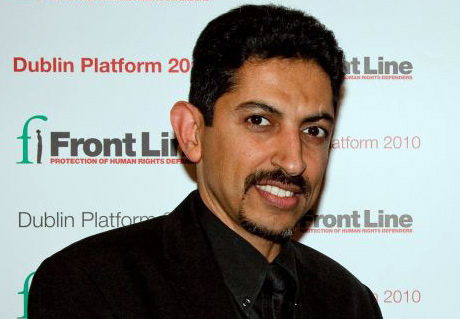In a world filled with stories of courage and resilience, the tale of Abdulhadi Al-Khawaja, a dual Danish-Bahraini citizen, stands as a testament to an unwavering commitment to human rights principles. Aged 62, Al-Khawaja’s journey as a human rights defender has left an indelible mark on the global stage. As co-founder of both the Gulf Centre for Human Rights (GCHR) and the Bahrain Center for Human Rights (BCHR), he has been a relentless advocate for justice, freedom, and the protection of human rights. He emphasizes that progress is accomplished when we recognize the leader within ourselves and consistently uphold the concept that no individual is greater than the cause. His passion and commitment to that cause have earned him many prestigious awards, including the Dignity – World without Torture Award in 2013 and, most recently, the Martin Ennals Award for Human Rights Defenders in 2022.
However, Al-Khawaja’s inspiring journey took a harrowing turn in 2011. He was sentenced to life in Jaw prison for leading peaceful protests during the popular uprising in Bahrain. The detention and treatment of Al-Khawaja, who was convicted following an unfair military trial in 2011 and a retrial in 2012, caused international concern. His recent hunger strike in response to inadequate medical care highlights the urgency of the situation.
Al-Khawaja’s commitment to his principles remained unshaken, even within the confines of a prison cell. His tale mirrors the larger struggle for justice and human rights in Bahrain. Most Bahraini human rights defenders are imprisoned, exiled, under travel ban, or enduring severe threats and intimidation due to their peaceful work. Dozens have been abused and tortured. International NGOs and journalists have been prevented from visiting Bahrain to document Bahrain’s ongoing human rights violations.
The situation took an even more grave turn in early 2023, when Al-Khawaja initiated his latest hunger strike. This came after the prison authorities denied him adequate medical care despite experiencing cardiac arrhythmia in February. Despite experiencing cardiac arrhythmia, the prison administration denied him adequate medical care. This dramatic turn of events underscores his dire circumstances and the urgent need for international intervention.
During their annual Human Rights Dialogue with Bahrain, the European Union (EU) has repeatedly brought up the human rights violations in Bahrain, including the case of Abdulhadi Al-Khawaja. Even though they have observed some positive developments, including the increase in the use of alternative punishments has increased, persistent problems such as torture, inhumane prison conditions, and the treatment of prisoners of conscience require continued international pressure and attention.
It is essential that the international community advocate for Abdulhadi Al-Khawaja’s release. The circumstances of Al-Khawaja’s arrest, the severe torture he endured during interrogation, and his deprivation of liberty as a result of his peaceful activism render him arbitrarily detained, as determined by the Working Group on Arbitrary Detention, are in violation of the Convention Against Torture and the International Covenant on Civil and Political Rights, to which Bahrain is a party.
The fate of Al-Khawaja hangs in the balance, and the question before us is whether global pressure and solidarity can secure his freedom. We call for the immediate and unconditional release of Abdulhadi Al-Khawaja and other political detainees. Furthermore, we urge the authorities to provide adequate and timely medical care and allow Al-Khawaja and all prisoners proper contact with their families. Finally, Bahrain should guarantee in all circumstances that human rights defenders in Bahrain can carry out their legitimate activities without fear of reprisals and free of all restrictions, including judicial harassment.

